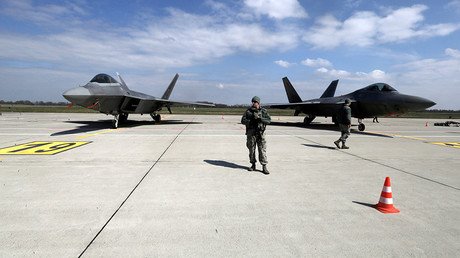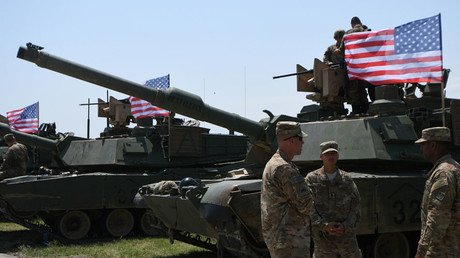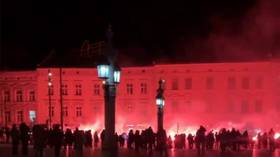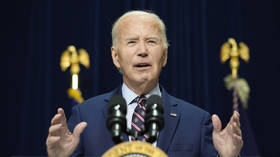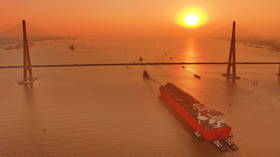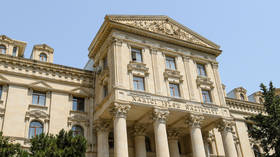‘US Orwellian ‘Russia threat’ used to increase military spending'
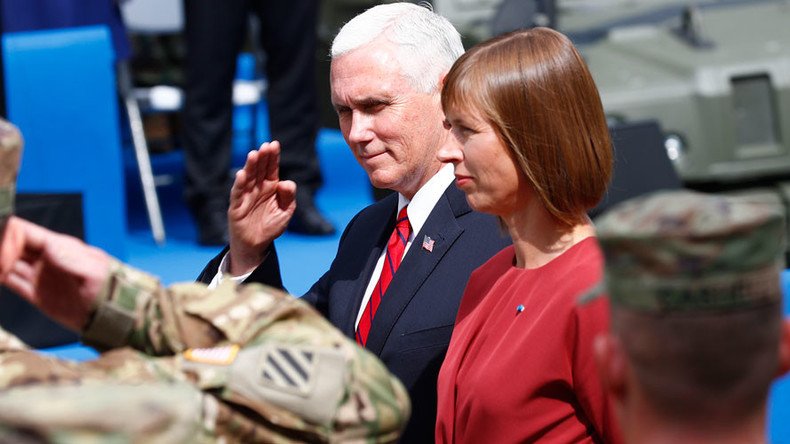
The strategy of US neocons is to get closer to the Russian bear until it finally becomes aggressive. If not, they will at least scare the population and other countries into greater military spending, explains international affairs commentator Marko Gasic.
US Vice-President Mike Pence traveled to Estonia on Monday, where he reconfirmed Washington's commitment to secure the Baltic States against an alleged "Russian threat."
Pence is on a trip through Eastern Europe to show support to Washington's NATO allies. During a news conference in Tallinn, the capital of Estonia, he reaffirmed the US' commitment to Article 5 of the NATO treaty saying: "An attack on one of us is an attack on us all."
RT spoke to Marco Gasic, an international affairs commentator, who thinks Pence's trip is part of a US strategy to provoke a Russian reaction.
RT: During the news conference in Tallin, Mike Pence underlined that Russia is the biggest security threat to the Baltic States. Does the country pose such a threat?
Marko Gasic: Mike Pence’s description of Russia as being the greatest threat is something straight out of George Orwell’s 1984 in which the peoples of Oceania were invited to hate the peoples of Eurasia. With Oceania, of course, being today’s NATO pact led by Washington and Eurasia being Russia. The problem for Mike Pence is that Russia is not being aggressive enough. In fact, it is not being aggressive at all. The strategy we are seeing now by the US administration - in fact by the neocons in the US administration - is to get closer and closer to the Russian bear … until it finally becomes aggressive. And then to turn to the world and tell to the world “Look, we told you so.” That is the strategy; it is not working very well. But the US has a twin-track approach. If it doesn’t do anything else, it will scare other countries to spend and scare its own population to agree that spending on domestic budgets should be on weapons as well. If nothing else, the idea of Pence’s strategy is to justify more spending and more benefit to the military-industrial complex.
RT: Why does Europe accept the hawkish rhetoric against Russia and perceive it as a threat?
MG: Europe is traditionally - in foreign policy and military terms – a lackey of the US operating through the NATO alliance. A NATO alliance is the means by which Europe gets its orders from the US. This has been a historical pattern, and European politicians see no advantage in engaging in open conflict with the US of America. Having said that, the rival Trump who has been demonized in his own country as well as in Europe itself has allowed European politicians to make some distance between them and American policy. But in general terms, Europe is fully aware that its economic benefit is in a proper close alliance with Russia and not in very expensive arms of its American partner, which would like to cut Europe off from Russia.
RT: The Latvian representative at the conference claimed the new US sanctions can protect countries from Russia. Do you think the sanctions will do that?
MG: The US attempts to present Russia as a threat to the world which requires a great deal of military spending and weapons spending to stop is in many dimensions. We have a diplomatic offensive by Mike Pence; we have the economic offensive of the Senate’s sanctions against Russia designed to be institutionalized in perpetuity. And we also have the media manipulation through these absolutely groundless, evidence-less accusations constantly repeated like the best propaganda, the big lie of Joseph Goebbels of Russia’s supposed interference in the US elections. The nature of the interference is never specified but is always repeated like a mantra. This is a triple-pronged approach to demonizing Russia. And in all of its aspects, it is a very unfair approach because the Russians have been characterized by a great deal of moderation on the part of Mr. Putin and his government, and we see no evidence of aggression from Russia. We do see a great deal of evidence of aggression from the US and its encroachments of Russia’s strategic geopolitical space.
The sanctions are not designed to help anyone on the planet apart from a military-industrial complex. The idea is for Russia’s difficult position to be institutionalized to make Trump’s desire for rapprochement with Russia an impossible one. The aim of these sanctions is to lock American policy into interminable neocon warmongering direction from which nobody can escape. And anyone who opposes this direction is again by association accused of being with the enemy.
The statements, views and opinions expressed in this column are solely those of the author and do not necessarily represent those of RT.
